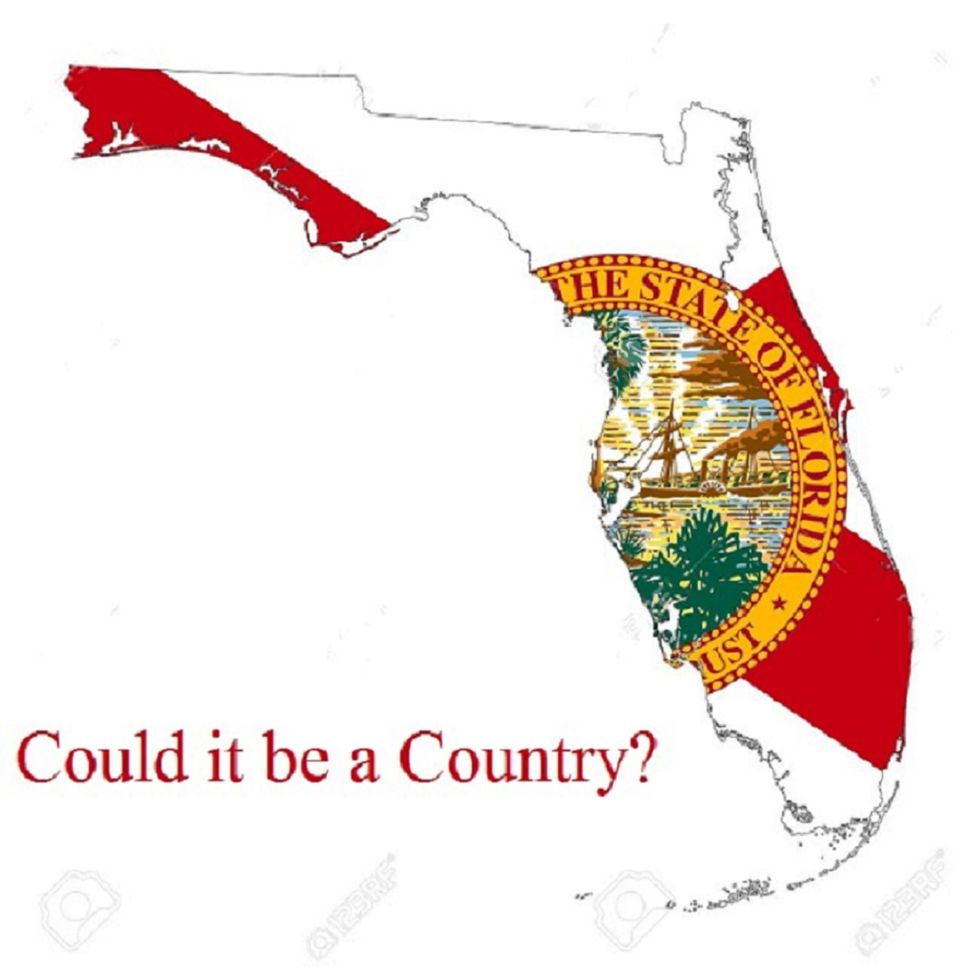As we enter 2017 and America recovers from the recent 2016 Presidential Election a certain word is on the lips of many Americans: Secession.
With California, Texas and Florida having legitimate political thoughts on leaving the United States of America a question is popping up on everyone's mind. Could these States function as Sovereign Nations? Could my State? How would they do so?
In this 50 part series we explore each State in terms of it that State could survive as a Nation by looking at how that State currently fairs and could hypothetically fair in the terms of three categories:
Economics-This looks at how much money that State is making compared to how much it spends, what it exports and imports and how it would impact the world on an Economic scale.
Political-The Political standpoint of the State is taken into account to try to grasp an understanding on how that State would be governed as an independent Nation. The method of Government can have massive impact on the Economy and foreign affairs so it is essential to consider.
Sociocultural-What would the society and culture of this Nation look like based off of the State it is formed from? The Social and Cultural ideologies of a Nation ultimately can decide not only the role it will play to the World, but also how long it will last.
There is one State that I personally see as the brightest spot in America. It acts as a tropical paradise for the temperament rest of the Nation and is well known for its great mixing of cultures, especially from Latin America and the Caribbean. This is of course the Sunshine State of Florida.
Florida as a State
Florida is seen by America as the odd ball State. With its long stretches of beaches on both the Atlantic Ocean and Gulf of Mexico, a nearly non-existent winter, an abundance of wildlife that can be found nowhere else and more major cities loaded with attractions than most can comprehend, it is no wonder that the peninsula is the quintessential vacation spot. This niche has also made Florida an extreme melting pot for both the other States and neighboring countries. Far less people are actually born in Florida than those who live there. It is not uncommon for Florida cities to have neighborhoods of Northerners who have retired to the State known to locals as 'Snowbirds,' Southerners from neighboring States like Georgia or Alabama, the occasional family from the Western half of the country giving coastal life a try and hamlets of immigrants from the Caribbean Islands or Latin American Countries. Along with its huge tourism industry, the State is an industrial and agricultural center. The unique climate of the State allows it to grow fruits and vegetables all year such as oranges. Its many major cities and ports act as centers of commerce and industry. With these vast resources at its disposal, could Florida survive on its own? Or would it crack from the pressure of its differing cultures?
Economics
Florida has found itself in an excellent economic position. Its subtropical climate has made it the perfect place for two things. Agriculture and tourism. Florida is able to produce a wide range of agricultural goods, from citrus plants such as oranges that can not grow in most parts of America to livestock and poultry. Florida is populated by tourist attractions ranging from theme parks like Disney World, national parks such as the Everglades and Historical sites like the Spanish Forts at the hearts of older cities such as St. Augustine. The lovely weather has also caused massive influxes of people moving to Florida from other States. This is why the State is covered in major cities and has the fourth largest population of any State. Large populations often lead to large businesses, and Florida is no exception. Real estate, Insurance and any number of any large corporations have large bases in Florida and aid in insuring it has a strong and sustainable economy. Florida is also uniquely situated as a peninsula between the Atlantic and Gulf of Mexico. This means it is naturally a major port. Almost all of its coastal cities function as centers of trade. The only economic sector that Florida truly lacks in is mining. Florida is located on limestone and lacks many mineral resources such as valuable metals or stones. It also lacks petroleum and oil resources, it could be possible though for it to gain small amounts of petrol by drilling in the gulf.
Political
Diversity is always a driving force in Politics. I believe that in an independent Florida it would continue to serve this purpose. Florida has usually tended to lean towards a liberal view of thinking. The Libertarian ideology of small government and more freedom is prominent among the peninsula's voters. There are distinct areas of difference though. The Southern portion of the Country with its major cities and a large portion of immigrants making up the population typically is more Democratic. The Northern half with less major cities but more native born Floridians is more Conservative. An independent Florida would likely face the problem of finding ways for both the diverse populations within it such as its Latin American communities, Conservative Southerners and so many more groups, and the two split sides of the peninsula. For Florida to survive it would need to find a balanced system that could appeal to all of these differing groups. If Florida can not find a balanced government it is possible that it could divide into two Nation's, a Northern and Southern Florida. It is not as far fetched an idea as it may seem, as both halves have the resources to survive.
Sociocultural
The sudden change to an independent Florida, or possibly even Florida's, would potentially have a massive impact on the lives of its people. With so many different cultures mixing in Florida, many of them complete opposites of each other, there would be disputes over governance from the get-go that would be based on civil strife. For the sake of this article, we are going to hypothesize that Florida does actually split and examine the lives of those living in North Florida, and South Florida. North Florida would function similarly to the coastal regions of South Carolina and other Southeastern States. It's pleasant climate, gulfside beaches and large historic cities like Jacksonville and Tallahassee would continue to draw in tourism. North Florida would likely be more conservative that its Southern counterpart and likely take after its neighbor Georgia and Alabama with much of the population being Christian and following traditional American values. South Florida is a whole different animal. To start off, it is a major trading hub with less of a focus on tourism from America (it still receives heavy tourism, just not on the same scale as its Northern Separatist) and more on the shipping and trading of its agricultural and fishing goods. In South Florida immigration has played a massive role in its development with a wide variety of peoples calling it home. You are just as likely to find someone speaking Spanish as you are English. Unsurprisingly these two different cultures would butt heads fairly often.
Could Florida Be A Country?
It is in my honest opinion that if Florida was to become a country it could not only survive but it would thrive. Florida already is heavily self-sufficient due to ts agricultural abilities and key location as a trade site. Even in independence, vacationers from the North would certainly still be flooding to its sunny shores, their wallets loaded and ready to stimulate the new Florida economy. The true question is not if Florida can survive but how it will. Would it be able to continue functioning the same way it does as a State despite the sudden impulses of diversity tearing it apart? Or would it break apart as theorized in this article? As an American, I hope that we never have to find out what would happen if we lost the Sunshine State.



















